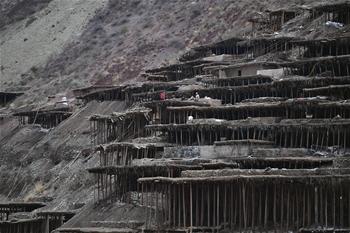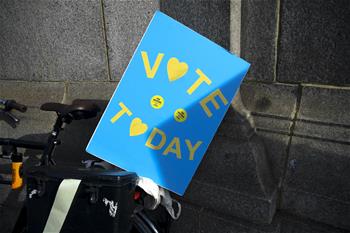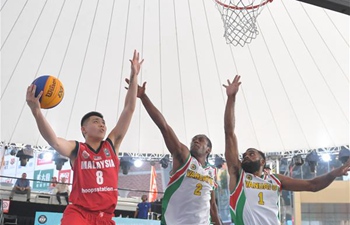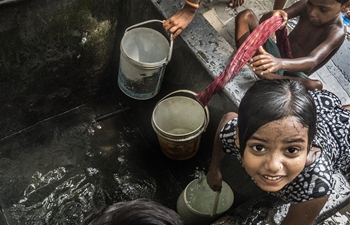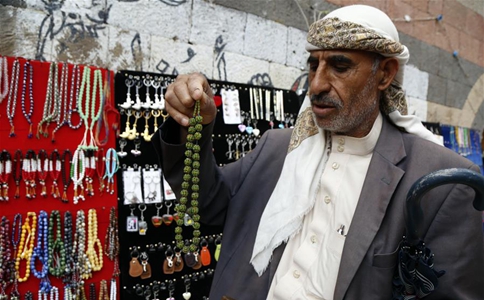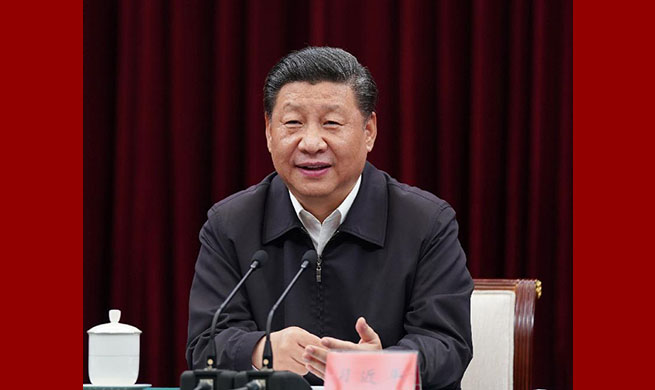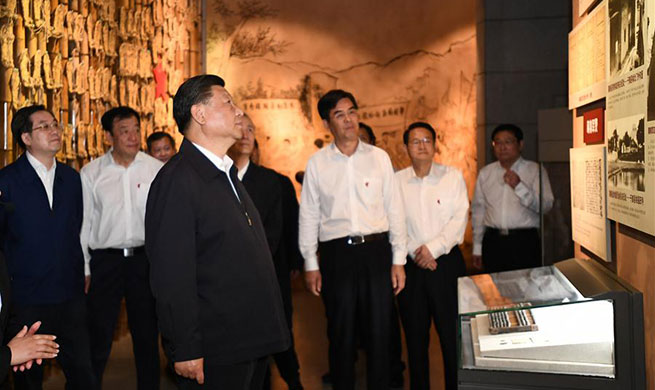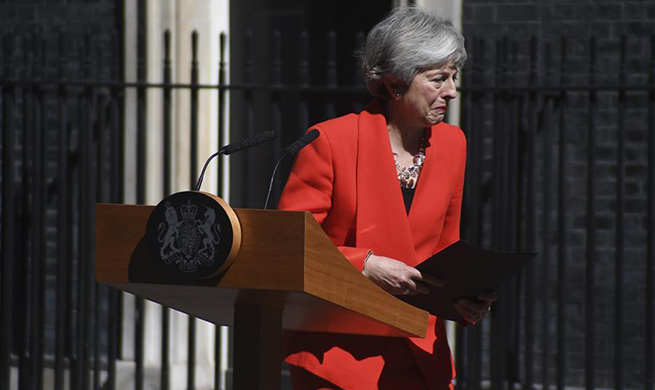by Murad Abdo
ADEN, Yemen, May 24 (Xinhua) -- Yemen's years-long internal military conflict raging between the Houthi rebels and the country's government backed by Saudi Arabia witnessed a major turn and started to pose a real threat for the region's security and stability, experts said.
The Iran-allied Houthi rebels turned to launching attacks using numerous explosives-laden drones against vital institutions deep inside Saudi Arabia amid heightened tension between Iran and Saudi Arabia backed by the United States.
Two separate drone attacks on Saudi Arabia's Najran airport were claimed by the Houthi rebels within 24 hours and just a few days after launching similar coordinated drone attacks on two oil pump stations near Riyadh.
Yemeni experts believe that the escalation of the Houthi drone attacks indicate that the country's years-long conflict started in expansion far beyond the borders to include other neighboring countries in the region.
The professor of political sociology at the University of Sanaa Abdul Baqi Shamsan told Xinhua that the timing of the frequent Houthi drone attacks aimed at delivering obvious messages from Iran to its rivals in the region, particularly Saudi Arabia.
"It's obvious that Iran started to use its loyal proxies in the region, including the Houthi militias, for the purpose of hurting Saudi Arabia indirectly through simply manufactured drones," said Abdul Baqi.
He also said that "the intervention of Saudi Arabia and its allies in Yemen's crisis negatively helped in weakening the country's legitimate government instead of offering support as declared previously in the beginning of the anti-Houthi military campaign in 2015."
"The role of the legitimate government is too weak and it has no control even in the liberated areas recently controlled by outlaws. This enabled Houthis to gain strength and continue in their defiance for the Saudi-led that's using strategies against Yemen's interests and sovereignty," he added.
During the past days, the Houthi Defence Ministry based in Sanaa showed a new defiance through declaring that the recent drone attacks came as the first batch of a large upcoming military operation that includes 300 targets against vital targets in Saudi Arabia and the United Arab Emirates (UAE).
The surprise development of the Houthis military capabilities and tactics raised a number of questions among Yemen's local observers following years of an intense aerial bombardment launched by the Saudi-led coalition against the rebels-held military locations across the country.
Brigadier Mohammed Jawas, strategic military expert based in the southern port city of Aden, revealed to Xinhua the major factors that helped Houthis to develop their military equipment despite the presence of the Saudi-led coalition in Yemen.
"The Saudi-led coalition succeeded in destroying the Houthi military capabilities but failed in tightening supervision and securing the borders of Yemen to prevent the operations of smuggling weapons and drones to the rebels from their foreign allies," said Jawas.
He expected that the Houthis' recent military escalation against Saudi Arabia may lead to serious consequences, including destabilizing the regional security and stability and promoting for imminent confrontation between rival powers in the region.
"Recently the region's situation is very tense and the United States imposed a series of sanctions on Iran that apparently resorted to using its Houthi proxies to attack the strategic allies of the U.S. in the region particularly Saudi Arabia," he said.
"The Houthi militias are playing a very dangerous game and attacking the strategic interests of the United States in the region may put the rebels in real military confrontation with America and the International Community," warned Jawas.
Washington and Tehran have been locked in a war of words over the past two weeks, and escalating tension that had been stoked up following America's increasing military buildup in the Middle East.
U.S. media reported on Wednesday that the Pentagon is expected to submit plans to the White House to send up to 10,000 troops to the Middle East amid increasing tensions with Iran.
Ali Hadi, another Yemeni military expert and observer, told Xinhua that Iran exploited its strong ties with the Houthis and deliberately pushed the rebels to step up their drone attacks against Saudi Arabia as a response for the ongoing U.S. escalation against Iran.
He said that "Iran is facing U.S. pressures and the increasing Houthi drone attacks on Saudi Arabia is considered as a warning message to Washington from the regime in the Islamic State that is trying to show its ability to expand the war to include the Gulf states."
On May 14, Houthi spokesman Mohammed Abdulsalam said on Twitter that the attack on Saudi oil facilities was a response to the Saudi attacks on his group, vowing Houthis' readiness to launch more such attacks.
Adil Al-Shujaa, politics professor from Sanaa University, told Xinhua that "there is some mystery surrounding the ongoing war particularly in the part of depicting the Houthi group as an invincible rising force because that's completely untrue."
"It's very clear that a country with a long history and experience in such technology stands behind the latest Houthis drone attacks for the aim of further blackmailing Saudi Arabia," said professor Adil.
Saudi Arabia called for holding emergency regional talks with Gulf leaders and Arab states in two summits in Mecca on May 30 to discuss the escalating tensions in region following the intensified Houthi drone attacks against the kingdom.
The Houthis aligned with Iran launched a large military campaign and seized the capital Sanaa in late 2014, forcing Yemen's President Abdu-Rabbu Mansour Hadi and his government to flee into the southern port city of Aden.
Subsequently, the pro-Houthi forces backed by armored vehicles attacked Aden and shelled Hadi's Republican Palace, leading him to escape again into exile in neighboring Saudi Arabia.
Saudi Arabia with other Arab countries intervened militarily and began pounding the Houthi-controlled capital Sanaa in March 2015 in response to an official public request from Hadi to protect Yemen and roll back Iran's influence.
Currently, some 24 million Yemenis, or 80 percent of the entire population, need humanitarian aid and protection, with some 20 million requiring help to secure food, the United Nations said.




